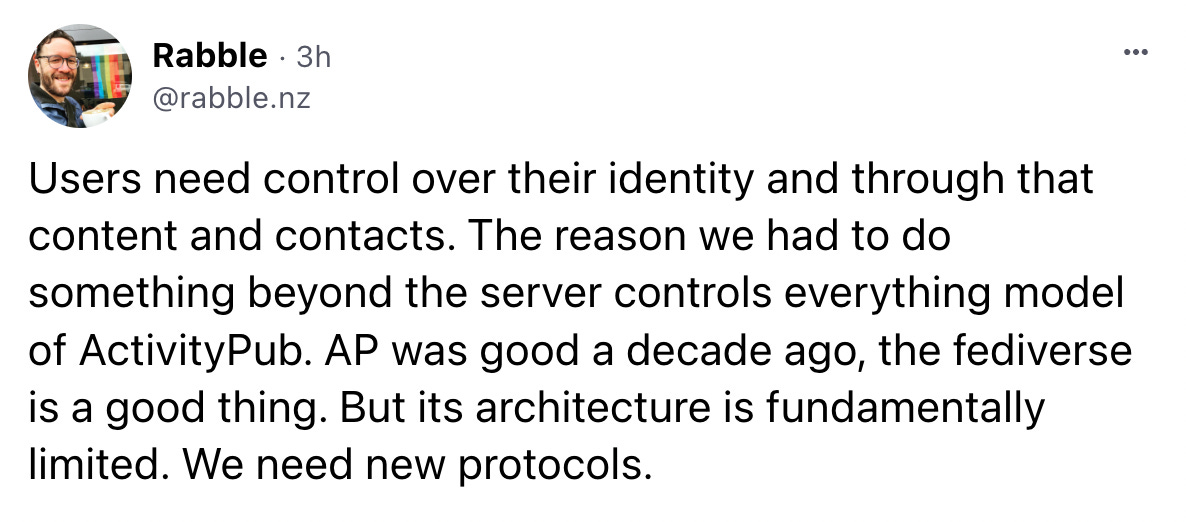So, here’s a provocation from Rabble, who also happened to be a founding engineer at Twitter:

This is a great minimal definition of user agency!
- Own your ID
- Own your content
- Own your contacts
Why do you need all three?
- If you don’t own your content, you’re stuck. Owning your content is necessary for agency! However, it is not sufficient, because…
- If you own your content, but don’t own your contacts, then you will lose your entire social graph when you switch services. Network effect will keep you locked in.
- If you own your content and contacts, but don’t own your ID, you don’t really own anything. Why? IDs are upstream of access. Specifically, this is about who owns your name, and the cryptographic keys that secure your ID, under the hood. If your name is owned by an authority, you lose it if you leave. If your keys are owned by an authority, they are in control. They can lock you out of your stuff, snoop on your private messages, delete your account, or refuse to let you move it elsewhere. So self-sovereign IDs and keys are crucial for agency.
When you own your ID, content, and contacts, you have agency, because you have credible exit. You can seamlessly change services and bring everything important with you, like switching carriers for your mobile phone.
The minimal definition of user agency: own your ID, your content, and your contacts.
User agency is a core goal for us at Subconscious. It’s why we built Noosphere, a protocol for thought.
Noosphere is sort of like “what if Roam/Notion/LogSeq, but a protocol”. A worldwide decentralized thought graph, made up of individual graphs called spheres.
Your sphere is like your inventory on Noosphere. It’s a data structure that contains your content and contacts.

Spheres are published to IPFS, a decentralized network. This decouples your data from any particular app or domain. Your sphere can live anywhere or everywhere at once, and is accessible from any IPFS peer. If a service tries to lock you in, you can always get your content through another node in the decentralized network.
Your sphere is signed with a key that you control. This decouples auth from any particular app or authority. Using your cryptographic key, it’s possible to prove content is secure, no matter where it lives on the network, or what service is hosting it. You own your keys, you own your identity, you own your content.
A decentralized name system ties everything together, keeping your ID portable. In apps and on the web, names are rooted to a particular service, such as facebook.com/alice. If you change services, you lose your name and everything else. On Noosphere, your keys belong to you, and your account name stays the same, no matter where your content happens to live. You can change providers without losing your ID or breaking your links.

With Noosphere, we’re aiming to build a worldwide decentralized repository for thought, belonging to everybody. A decentralized graph, where you own thoughts, and have agency to move your data between services and apps. If that sounds like your jam, come build with us!
GitHub: subconsciousnetwork/noosphereLicense: Apache/MIT
Subconscious is our tool for thought, powered by Noosphere protocol.Sign up for the Subconscious Beta


All Comments